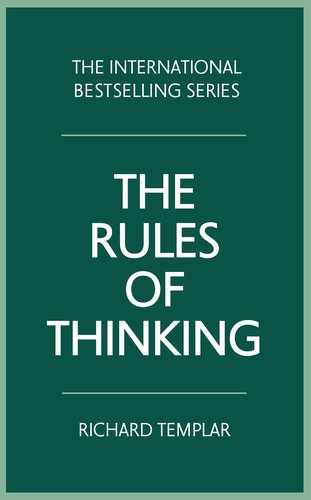Most of us, a lot of the time, start our decision making at square two. You know you want to change jobs; the question is what kind of new work should you look for. Or you need to move house to somewhere bigger, but where? Or which university course should you apply to?
These all seem like reasonable challenges to set yourself, but you need to go back to square one with all of them. Maybe square one still leads to square two, but think it through consciously to be sure it does. Here is square one for the examples I’ve just given you:
- Are you sure you want to change jobs? Or could you change whatever you don’t like about your current job – ask for a pay rise, or transfer, or go part time, or work from home, or sit at a different desk?
- Need to move house? It might be cheaper to extend your present house if space is the problem. Or rent out rooms if running costs are the issue.
- Heading to uni? Have you consciously ruled out going straight into a job, or taking time out, or doing an apprenticeship of some kind?
Square one means sticking with what you’re currently doing, with adjustments. Of course very often square two does turn out to be the next step. Not always though, and the status quo – square one – is almost always the cheapest, simplest, quickest option. Even if it needs a bit of tweaking. This is where clear, logical thinking is so important.
I remember a friend who was setting up a business from home, and was about to build a cabin in the back garden because she needed somewhere to run it from and store her stock. This was going to cost a fair bit, as the cabin would need heating and lighting and so on. She was busy getting quotes from builders and trying to minimise the costs, when she realised that she had a room in the house that almost never got used. With a bit of rejigging she could free it up completely and run the business from there instead. Not only cheaper but also much more convenient. She’d started at square two: ‘I need to build a space to run the business from’ instead of square one: ‘Do I need to build a space to run the business from? Or do I already have one?’ It can be hard to look at your living space in a whole new way, but this kind of thinking process can save you huge stress, upheaval and expense.
It’s surprising how few people routinely practise this kind of thinking skill. To a Rules thinker, however, this should be instinctive. Any time you are about to embark on a change that will be costly or stressful, always make sure you really need to do it. I’m not arguing against change in itself – it can be fun, exciting and shake us up in a good way. However this is about decisions that are prompted by some kind of dissatisfaction with the way things currently are, or an enforced change such as leaving school, or redundancy. The tendency can be to think you need much bigger changes than maybe you do. Doing nothing – with a few tweaks – should always be one of the options on the table if it’s available.
THE STATUS QUO IS ALMOST ALWAYS THE CHEAPEST, SIMPLEST, QUICKEST OPTION. EVEN IF IT NEEDS A BIT OF TWEAKING
